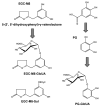Green Tea Suppresses Brain Aging
- PMID: 34443485
- PMCID: PMC8401650
- DOI: 10.3390/molecules26164897
Green Tea Suppresses Brain Aging
Abstract
Epidemiological studies have demonstrated that the intake of green tea is effective in reducing the risk of dementia. The most important component of green tea is epigallocatechin gallate (EGCG). Both EGCG and epigallocatechin (EGC) have been suggested to cross the blood-brain barrier to reach the brain parenchyma, but EGCG has been found to be more effective than EGC in promoting neuronal differentiation. It has also been suggested that the products of EGCG decomposition by the intestinal microbiota promote the differentiation of nerve cells and that both EGCG and its degradation products act on nerve cells with a time lag. On the other hand, the free amino acids theanine and arginine contained in green tea have stress-reducing effects. While long-term stress accelerates the aging of the brain, theanine and arginine suppress the aging of the brain due to their anti-stress effect. Since this effect is counteracted by EGCG and caffeine, the ratios between these green tea components are important for the anti-stress action. In this review, we describe how green tea suppresses brain aging, through the activation of nerve cells by both EGCG and its degradation products, and the reductions in stress achieved by theanine and arginine.
Keywords: arginine; brain aging; catechin; epigallocatechin gallate; green tea; stress reduction; theanine.
Conflict of interest statement
The authors declare no conflict of interest.
Figures










Similar articles
-
Anti-stress effects of drinking green tea with lowered caffeine and enriched theanine, epigallocatechin and arginine on psychosocial stress induced adrenal hypertrophy in mice.Phytomedicine. 2016 Nov 15;23(12):1365-1374. doi: 10.1016/j.phymed.2016.07.006. Epub 2016 Jul 25. Phytomedicine. 2016. PMID: 27765356
-
Stress-Reducing Function of Matcha Green Tea in Animal Experiments and Clinical Trials.Nutrients. 2018 Oct 10;10(10):1468. doi: 10.3390/nu10101468. Nutrients. 2018. PMID: 30308973 Free PMC article. Clinical Trial.
-
Function of Green Tea Catechins in the Brain: Epigallocatechin Gallate and its Metabolites.Int J Mol Sci. 2019 Jul 25;20(15):3630. doi: 10.3390/ijms20153630. Int J Mol Sci. 2019. PMID: 31349535 Free PMC article. Review.
-
Stress-Relieving Effects of Japanese Green Tea: Evaluation Using the Molar Ratio of Caffeine and Epigallocatechin Gallate to Theanine and Arginine as an Indicator.Foods. 2025 Jan 2;14(1):103. doi: 10.3390/foods14010103. Foods. 2025. PMID: 39796392 Free PMC article.
-
Effect of Green Tea Phytochemicals on Mood and Cognition.Curr Pharm Des. 2017;23(19):2876-2905. doi: 10.2174/1381612823666170105151800. Curr Pharm Des. 2017. PMID: 28056735 Review.
Cited by
-
Epigallocatechin-3-Gallate (EGCG): New Therapeutic Perspectives for Neuroprotection, Aging, and Neuroinflammation for the Modern Age.Biomolecules. 2022 Feb 25;12(3):371. doi: 10.3390/biom12030371. Biomolecules. 2022. PMID: 35327563 Free PMC article. Review.
-
Green Tea Polyphenol (-)-Epigallocatechin-3-Gallate (EGCG): A Time for a New Player in the Treatment of Respiratory Diseases?Antioxidants (Basel). 2022 Aug 13;11(8):1566. doi: 10.3390/antiox11081566. Antioxidants (Basel). 2022. PMID: 36009285 Free PMC article. Review.
-
Coffee Polyphenol, Chlorogenic Acid, Suppresses Brain Aging and Its Effects Are Enhanced by Milk Fat Globule Membrane Components.Int J Mol Sci. 2022 May 23;23(10):5832. doi: 10.3390/ijms23105832. Int J Mol Sci. 2022. PMID: 35628642 Free PMC article.
-
Stress Reduction Potential in Mice Ingesting DNA from Salmon Milt.Biology (Basel). 2023 Jul 10;12(7):978. doi: 10.3390/biology12070978. Biology (Basel). 2023. PMID: 37508408 Free PMC article.
-
Exploring the Therapeutic Potential of Green Tea (Camellia sinensis L.) in Anti-Aging: A Comprehensive Review of Mechanisms and Findings.Mini Rev Med Chem. 2025;25(5):403-424. doi: 10.2174/0113895575331878240924035332. Mini Rev Med Chem. 2025. PMID: 39377377 Review.
References
-
- Nishizaki Y., Kuwahira I., Kawada H., Kubo A., Kataoka K., Tanaka S., Sueno T., Isozaki M., Kobayashi H., Nakamura Y., et al. Beneficial effects of medical advice provided to elderly persons under the anti-aging health check-up system at Tokai University Tokyo Hospital. Tokai J. Exp. Clin. Med. 2009;34:142–151. - PubMed
-
- Saito E., Inoue M., Sawada N., Shimazu T., Yamaji T., Iwasaki M., Sasazuki S., Noda M., Iso H., Tsugane S., et al. Association of green tea consumption with mortality due to all causes and major causes of death in a Japanese population: The Japan Public Health Center-based Prospective Study (JPHC Study) Ann. Epidemiol. 2015;25:512–518.e3. doi: 10.1016/j.annepidem.2015.03.007. - DOI - PubMed
-
- Noguchi-Shinohara M., Yuki S., Dohmoto C., Ikeda Y., Samuraki M., Iwasa K., Yokogawa M., Asai K., Komai K., Nakamura H., et al. Consumption of green tea, but not black tea or coffee, is associated with reduced risk of cognitive decline. PLoS ONE. 2014;9:e96013. doi: 10.1371/journal.pone.0096013. - DOI - PMC - PubMed
Publication types
MeSH terms
Substances
LinkOut - more resources
Full Text Sources
Medical

